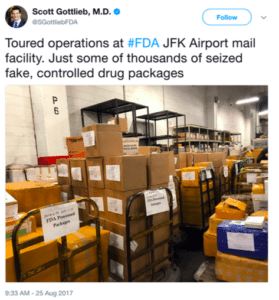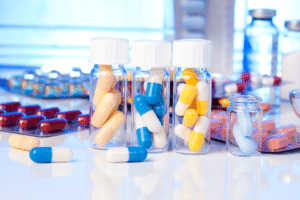Letter Asking the President And Congress to Protect Americans from Imported Drugs, October 30, 2018
Today, The Partnership for Safe Medicines (PSM) sent a letter to President and Members of Congress urging them to protect Americans from the threat of unregulated, imported medicines flowing into our borders.
October 30, 2018
Dear President Donald J. Trump, members of the United States Senate, and members of the United States House of Representatives:
As organizations that represent thousands of law enforcement, healthcare professionals, patient advocates, and consumer interest groups, we are writing to express our deep concerns with and opposition to proposals to import non-FDA-approved medications that could endanger the health and safety of our communities.
Importing non-FDA-approved medications outside the licensed and secure supply chain endangers patients
Historically, attempts to import drugs from “safe countries” like Canada result in Americans getting counterfeit, substandard or black market medication. These substandard products are often trans-shipped through Canadian free trade zones or shipped direct from countries like China or India, but they never enter the Canadian regulatory sphere.
There is no oversight, safety enforcement or U.S. FDA protection for medication obtained from foreign entities unlicensed in the U.S. Health Canada does not inspect regulate, or supervise the medication from other countries that Canadian companies sell to Americans, because they aren't bringing those medicines into the Canadian drug supply.
Four previous U.S. Food and Drug Administration commissioners have studied this problem and concluded that the added costs of attempting to secure medicine from black market sources would eliminate any savings possible through such a program. They are clear that American patient safety would be compromised.
Every day, U.S. law enforcement is working to prosecute these foreign counterfeiters, but they sometimes have a great deal of difficulty bringing them back to the United States for trial even when these counterfeiters have cost American lives. As has been noted in law enforcement efforts to stem the crisis of Chinese-made fentanyl, China and the U.S. do not have an extradition treaty. This requires that we get permission from the Chinese government to prosecute cases when their citizens harm Americans: permission we won’t always receive.
For many patients, a counterfeit medicine with substandard or no active ingredient is a death sentence, even if it does not contain dangerous additives. For individuals with HIV, these counterfeit medicines can impact viral suppression and create life-long treatment resistance. For those battling cancer, a counterfeit medication means that tumors grow unchecked and the patient’s fight against cancer is thwarted by a crime they may never detect.
Importing medications will worsen the opioid crisis and endanger law enforcement
According to the U.S. Centers for Disease Control, over 29,000 Americans overdosed on synthetic opioids such as fentanyl in 2017, most of which is imported from Chinese labs by global drug smugglers, including global drug cartels such as the Sinaloa cartel. As of the writing of this letter, fentanyl-based counterfeit medications have been found in 45 states and killed Americans in at least 26 states that the Partnership for Safe Medicines has documented.
Increasing the importation of black market medical products will make it harder to catch these dangerous products at the border, causing more American deaths. Additionally, since the explosion of synthetic opioid abuse in 2015, first responders have reported dangerous fentanyl exposure incidents in 17 states.
Importing medications will directly disrupt the gold standard U.S. supply chain and create new liabilities for healthcare providers
As rare as counterfeits are in the closed, regulated drug supply chain, they have devastating results for patients involved. The Drug Quality and Security Act of 2013 set in motion a multi-year, extremely complex implementation of supply chain safety measures. Importation from unregulated foreign entities will break this “track and trace” system. Again, FDA Commissioners from both Republican and Democratic administrations have vocally opposed allowing importation. As fellow Americans, we do not discount the issue of financial barriers to access all forms of healthcare including medicine. However, there are a broad array of policy proposals that address concerns about medication. Legalized importation of non-FDA-approved medication should not be one of them.
We remain committed to working with you to better understand the concerns of our community. Our organizations may be contacted via the Partnership for Safe Medicines at 2019letter@safemedicines.org or through PSM’s Executive Director Shabbir Imber Safdar at the same email.
Sincerely,
The Partnership for Safe Medicines

